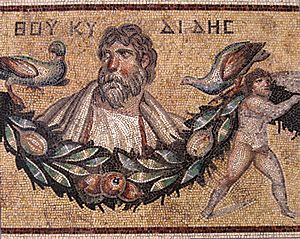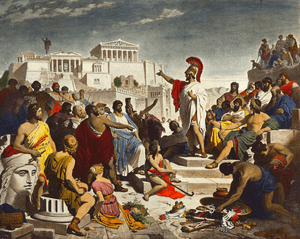Thucydides facts for kids
Quick facts for kids
Thucydides
|
|
|---|---|
| Θουκυδίδης | |
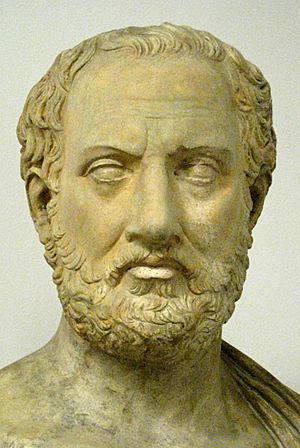
Plaster cast bust of Thucydides (in the Pushkin Museum) from a Roman copy (located at Holkham Hall) of an early fourth-century BC Greek original
|
|
| Born | c. 460 BC Halimous, Athens (modern Alimos)
|
| Died | c. 400 BC place of death unknown
|
| Occupation | Historian, general |
|
Notable work
|
History of the Peloponnesian War |
| Relatives | Oloros (father) |
Thucydides (/θ(j)uːˈsɪdɪˌdiːz/; Ancient Greek: Θουκυδίδης, romanized: Thoukudídēs; c. 460 – c. 400 BC) was an Athenian historian and general. His History of the Peloponnesian War recounts the fifth-century BC war between Sparta and Athens until the year 411 BC. Thucydides has been dubbed the father of "scientific history" by those who accept his claims to have applied strict standards of impartiality and evidence-gathering and analysis of cause and effect, without reference to intervention by the gods, as outlined in his introduction to his work.
He also has been called the father of the school of political realism, which views the political behavior of individuals and the subsequent outcomes of relations between states as ultimately mediated by, and constructed upon, fear and self-interest. His text is still studied at universities and military colleges worldwide. The Melian dialogue is regarded as a seminal work of international relations theory, while his version of Pericles' Funeral Oration is widely studied by political theorists, historians, and students of the classics.
More generally, Thucydides developed an understanding of human nature to explain behavior in such crises as plagues, massacres, and civil war.
Contents
Life
In spite of his stature as a historian, modern historians know relatively little about Thucydides's life. The most reliable information comes from his own History of the Peloponnesian War, in which he mentions his nationality, paternity, and birthplace. Thucydides says that he fought in the war, contracted the plague, and was exiled by the democracy. He may have also been involved in quelling the Samian Revolt.
Evidence from the classical period
Thucydides identifies himself as an Athenian, telling us that his father's name was Olorus and that he was from the Athenian deme of Halimous. A somewhat doubtful anecdote of his early life still exists. While still a youth of 10–12 years, he and his father were supposed to have gone to the agora of Athens where the young Thucydides heard a lecture by the historian Herodotus. According to some accounts, the young Thucydides wept with joy after hearing the lecture, deciding that writing history would be his life's calling. The same account also claims that after the lecture, Herodotus spoke with the youth and his father, stating: Oloros your son yearns for knowledge. In all essence, the episode is most likely from a later Greek or Roman account of his life. He survived the Plague of Athens, which killed Pericles and many other Athenians. There is a first observation of acquired immunity. He also records that he owned gold mines at Scapte Hyle (literally "Dug Woodland"), a coastal area in Thrace, opposite the island of Thasos.
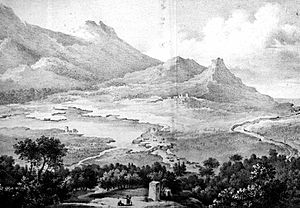
Because of his influence in the Thracian region, Thucydides wrote, he was sent as a strategos (general) to Thasos in 424 BC. During the winter of 424–423 BC, the Spartan general Brasidas attacked Amphipolis, a half-day's sail west from Thasos on the Thracian coast, sparking the Battle of Amphipolis. Eucles, the Athenian commander at Amphipolis, sent to Thucydides for help. Brasidas, aware of the presence of Thucydides on Thasos and his influence with the people of Amphipolis, and afraid of help arriving by sea, acted quickly to offer moderate terms to the Amphipolitans for their surrender, which they accepted. Thus, when Thucydides arrived, Amphipolis was already under Spartan control.
Amphipolis was of considerable strategic importance, and news of its fall caused great consternation in Athens. It was blamed on Thucydides, although he claimed that it was not his fault and that he had simply been unable to reach it in time.
Using his status as an exile from Athens to travel freely among the Peloponnesian allies, he was able to view the war from the perspective of both sides. This is all that Thucydides wrote about his own life, but a few other facts are available from reliable contemporary sources. Herodotus wrote that the name Olorus, Thucydides's father's name, was connected with Thrace and Thracian royalty. Thucydides was probably connected through family to the Athenian statesman and general Miltiades and his son Cimon, leaders of the old aristocracy supplanted by the Radical Democrats. Cimon's maternal grandfather's name also was Olorus, making the connection quite likely. Another Thucydides lived before the historian and was also linked with Thrace, making a family connection between them very likely as well.
Combining all the fragmentary evidence available, it seems that his family had owned a large estate in Thrace, one that even contained gold mines, and which allowed the family considerable and lasting affluence. The security and continued prosperity of the wealthy estate must have necessitated formal ties with local kings or chieftains, which explains the adoption of the distinctly Thracian royal name Óloros into the family. Once exiled, Thucydides took permanent residence in the estate and, given his ample income from the gold mines, he was able to dedicate himself to full-time history writing and research, including many fact-finding trips. In essence, he was a well-connected gentleman of considerable resources who, after involuntarily retiring from the political and military spheres, decided to fund his own historical investigations.
Later sources
The remaining evidence for Thucydides' life comes from later and rather less reliable ancient sources; Marcellinus wrote Thucydides' biography about a thousand years after his death. According to Pausanias, someone named Oenobius had a law passed allowing Thucydides to return to Athens, presumably shortly after the city's surrender and the end of the war in 404 BC. Pausanias goes on to say that Thucydides was murdered on his way back to Athens, placing his tomb near the Melite gate. Many doubt this account, seeing evidence to suggest he lived as late as 397 BC, or perhaps slightly later. Plutarch preserves a tradition that he was murdered in Skaptē Hulē and that his remains were returned to Athens, where a monument to him was erected in Cimon's family plot. There are problems with this, since this was outside Thucydides' deme and the tradition goes back to Polemon, who asserted he had discovered just such a memorial. Didymus mentions another tomb in Thrace.
Thucydides' narrative breaks off in the middle of the year 411 BC, and this abrupt end has traditionally been explained as due to his death while writing the book, although other explanations have been put forward.
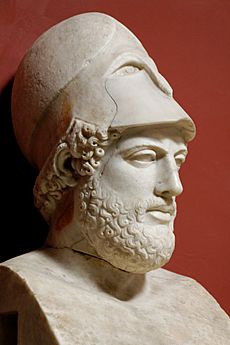
Inferences about Thucydides' character can be drawn (with due caution) only from his book. His sardonic sense of humor is evident throughout, as when, during his description of the Athenian plague, he remarks that old Athenians seemed to remember a rhyme which said that with the Dorian War would come a "great death". Some claimed that the rhyme originally mentioned a [death by] "famine" or "starvation" (λιμός, limos) and was remembered only later as [death by] "pestilence" (λοιμός, loimos) due to the current plague. Thucydides then remarks that should another Dorian War come, this time attended with a great famine (λιμός), the rhyme will be remembered as "famine", and any mention of "plague" (λοιμός) forgotten.
Thucydides admired Pericles, approving of his power over the people and showing a marked distaste for the demagogues who followed him. He did not approve of the democratic commoners nor of the radical democracy that Pericles ushered in, but considered democracy acceptable when guided by a good leader. Thucydides' presentation of events is generally even-handed; for example, he does not minimize the negative effect of his own failure at Amphipolis. Occasionally, however, strong passions break through, as in his scathing appraisals of the democratic leaders Cleon and Hyperbolus. Sometimes, Cleon has been connected with Thucydides' exile.
It has been argued that Thucydides was moved by the suffering inherent in war and concerned about the excesses to which human nature is prone in such circumstances, as in his analysis of the atrocities committed during the civil conflict on Corcyra, which includes the phrase "war is a violent teacher" (πόλεμος βίαιος διδάσκαλος).
The History of the Peloponnesian War
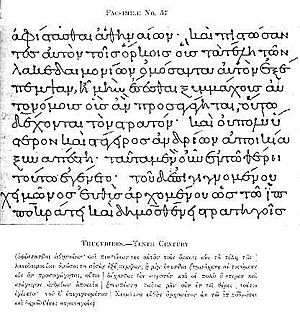
Thucydides believed that the Peloponnesian War represented an event of unmatched importance. As such, he began to write the History at the onset of the war in 431 BC. He declared his intention was to write an account which would serve as "a possession for all time". The History breaks off near the end of the twenty-first year of the war (411 BC), in the wake of the Athenian defeat at Syracuse, and so does not elaborate on the final seven years of the conflict.
The History of the Peloponnesian War continued to be modified well beyond the end of the war in 404 BC, as exemplified by a reference at Book I.1.13 to the conclusion of the war. After his death, Thucydides's History was subdivided into eight books: its modern title is the History of the Peloponnesian War. This subdivision was most likely made by librarians and archivists, themselves being historians and scholars, most likely working in the Library of Alexandria.
Thucydides is generally regarded as one of the first true historians. Like his predecessor Herodotus, known as "the father of history", Thucydides places a high value on eyewitness testimony and writes about events in which he probably took part. He also assiduously consulted written documents and interviewed participants about the events that he recorded. Unlike Herodotus, whose stories often teach that a hubris invites the wrath of the deities, Thucydides does not acknowledge divine intervention in human affairs.
Thucydides exerted wide historiographical influence on subsequent Hellenistic and Roman historians, although the exact description of his style in relation to many successive historians remains unclear. Readers in antiquity often placed the continuation of the stylistic legacy of the History in the writings of Thucydides' putative intellectual successor Xenophon. Such readings often described Xenophon's treatises as attempts to "finish" Thucydides's History. Many of these interpretations, however, have garnered significant scepticism among modern scholars, such as Dillery, who spurn the view of interpreting Xenophon qua Thucydides, arguing that the latter's "modern" history (defined as constructed based on literary and historical themes) is antithetical to the former's account in the Hellenica, which diverges from the Hellenic historiographical tradition in its absence of a preface or introduction to the text and the associated lack of an "overarching concept" unifying the history.
A noteworthy difference between Thucydides's method of writing history and that of modern historians is Thucydides's inclusion of lengthy formal speeches that, as he states, were literary reconstructions rather than quotations of what was said—or, perhaps, what he believed ought to have been said. Arguably, had he not done this, the gist of what was said would not otherwise be known at all—whereas today there is a plethora of documentation—written records, archives, and recording technology for historians to consult. Therefore, Thucydides's method served to rescue his mostly oral sources from oblivion. We do not know how these historical figures spoke. Thucydides's recreation uses a heroic stylistic register.
Thucydides omits discussion of the arts, literature, or the social milieu in which the events in his book take place and in which he grew up. He saw himself as recording an event, not a period, and went to considerable lengths to exclude what he deemed frivolous or extraneous.
Philosophical outlook and influences
Paul Shorey calls Thucydides "a cynic devoid of moral sensibility". In addition, he notes that Thucydides conceived of human nature as strictly determined by one's physical and social environments, alongside basic desires.
Thucydides' work indicates an influence from the teachings of the Sophists that contributes substantially to the thinking and character of his History. Possible evidence includes his skeptical ideas concerning justice and morality. There are also elements within the History—such as his views on nature revolving around the factual, empirical, and the non-anthropomorphic—which suggest that he was at least aware of the views of philosophers such as Anaxagoras and Democritus. There is also evidence of his knowledge concerning some of the corpus of Hippocratic medical writings.
Thucydides was especially interested in the relationship between human intelligence and judgment, Fortune and Necessity, and the idea that history is too irrational and incalculable to predict.
Comparison with Herodotus
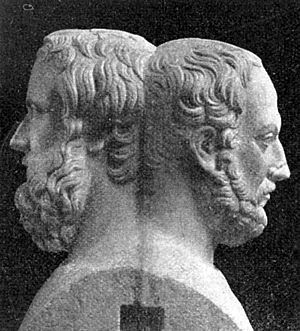
Thucydides and his immediate predecessor, Herodotus, both exerted a significant influence on Western historiography.
Herodotus records in his Histories not only the events of the Persian Wars, but also geographical and ethnographical information, as well as the fables related to him during his extensive travels. Typically, he passes no definitive judgment on what he has heard. In the case of conflicting or unlikely accounts, he presents both sides, says what he believes and then invites readers to decide for themselves. Of course, modern historians would generally leave out their personal beliefs, which is a form of passing judgment upon the events and people about which the historian is reporting. The work of Herodotus is reported to have been recited at festivals, where prizes were awarded, as for example, during the games at Olympia.
Herodotus views history as a source of moral lessons, with conflicts and wars as misfortunes flowing from initial acts of injustice perpetuated through cycles of revenge. In contrast, Thucydides claims to confine himself to factual reports of contemporary political and military events, based on unambiguous, first-hand, eye-witness accounts, although, unlike Herodotus, he does not reveal his sources. Thucydides views life exclusively as political life, and history in terms of political history. Conventional moral considerations play no role in his analysis of political events while geographic and ethnographic aspects are omitted or, at best, of secondary importance. Subsequent Greek historians—such as Ctesias, Diodorus, Strabo, Polybius and Plutarch—held up Thucydides's writings as a model of truthful history. Lucian refers to Thucydides as having given Greek historians their law, requiring them to say what had been done (ὡς ἐπράχθη). Greek historians of the fourth century BC accepted that history was political and that contemporary history was the proper domain of a historian. Cicero calls Herodotus the "father of history"; yet the Greek writer Plutarch, in his Moralia (Ethics) denigrated Herodotus, notably calling him a philobarbaros, a "barbarian lover", to the detriment of the Greeks. Unlike Thucydides, however, these authors all continued to view history as a source of moral lessons, thereby infusing their works with personal biases generally missing from Thucydides' clear-eyed, non-judgmental writings focused on reporting events in a non-biased manner.
Due to the loss of the ability to read Greek, Thucydides and Herodotus were largely forgotten during the Middle Ages in Western Europe, although their influence continued in the Byzantine world. In Europe, Herodotus become known and highly respected only in the late-sixteenth and early-seventeenth century as an ethnographer, in part due to the discovery of America, where customs and animals were encountered that were even more surprising than what he had related. During the Reformation, moreover, information about Middle Eastern countries in the Histories provided a basis for establishing Biblical chronology as advocated by Isaac Newton.
The first European translation of Thucydides (into Latin) was made by the humanist Lorenzo Valla between 1448 and 1452, and the first Greek edition was published by Aldo Manuzio in 1502. During the Renaissance, however, Thucydides attracted less interest among Western European historians as a political philosopher than his successor, Polybius, although Poggio Bracciolini claimed to have been influenced by him. There is not much evidence of Thucydides's influence in Niccolò Machiavelli's The Prince (1513), which held that the chief aim of a new prince must be to "maintain his state" [i.e., his power] and that in so doing he is often compelled to act against faith, humanity, and religion.
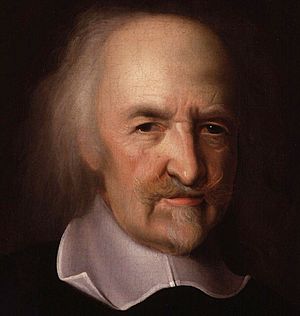
In the seventeenth century, the English political philosopher Thomas Hobbes, whose Leviathan advocated absolute monarchy, admired Thucydides and in 1628 was the first to translate his writings into English directly from Greek. Thucydides, Hobbes, and Machiavelli are together considered the founding fathers of western political realism, according to which, state policy must primarily or solely focus on the need to maintain military and economic power rather than on ideals or ethics.
Nineteenth-century positivist historians stressed what they saw as Thucydides's seriousness, his scientific objectivity and his advanced handling of evidence. A virtual cult following developed among such German philosophers as Friedrich Schelling, Friedrich Schlegel, and Friedrich Nietzsche, who claimed that, "[in Thucydides], the portrayer of Man, that culture of the most impartial knowledge of the world finds its last glorious flower." The late-eighteenth-century Swiss historian Johannes von Müller described Thucydides as "the favourite author of the greatest and noblest men, and one of the best teachers of the wisdom of human life". For Eduard Meyer, Thomas Babington Macaulay and Leopold von Ranke, who initiated modern source-based history writing, Thucydides was again the model historian.
These historians also admired Herodotus, however, as social and ethnographic history increasingly came to be recognized as complementary to political history. In the twentieth century, this trend gave rise to the works of Johan Huizinga, Marc Bloch, and Fernand Braudel, who pioneered the study of long-term cultural and economic developments and the patterns of everyday life. The Annales School, which exemplifies this direction, has been viewed as extending the tradition of Herodotus.
At the same time, Thucydides's influence was increasingly important in the area of international relations during the Cold War, through the work of Hans Morgenthau, Leo Strauss, and Edward Carr.
The tension between the Thucydidean and Herodotean traditions extends beyond historical research. According to Irving Kristol, self-described founder of American neoconservatism, Thucydides wrote "the favorite neoconservative text on foreign affairs"; and Thucydides is a required text at the Naval War College, an American institution located in Rhode Island.
Another contemporary historian believes that, while it is true that critical history "began with Thucydides, one may also argue that Herodotus' looking at the past as a reason why the present is the way it is, and to search for causality for events beyond the realms of Tyche and the Gods, was a much larger step."
See also
 In Spanish: Tucídides para niños
In Spanish: Tucídides para niños
- Speech of Hermocrates at Gela
- Thucydides Trap


